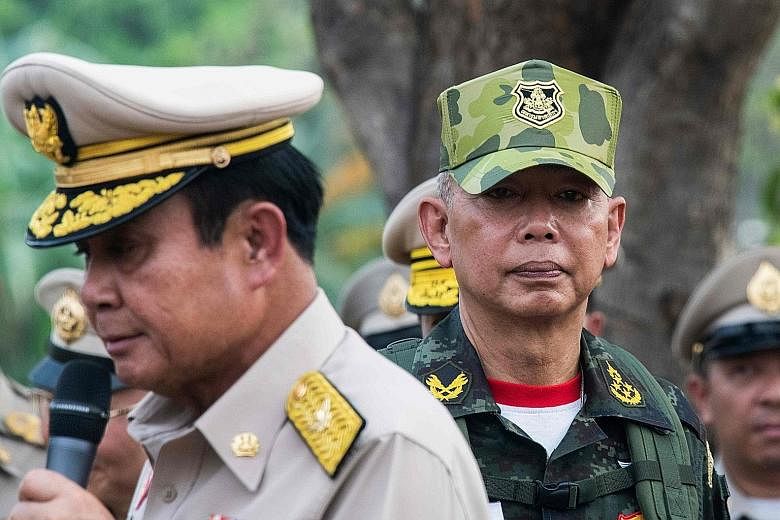As campaigning for Thailand's March 24 election heats up and puts military spending in politicians' crosshairs, the powerful army chief has warned against stirring resentment against the men in green.
The army is "the most able pillar that supports the country and the monarchy", General Apirat Kongsompong told The Straits Times in a rare interview on Thursday.
"The opposition... believe that if they can make the Thai people dislike or distrust the army, then the army may collapse. As a result, our country will be weakened and then what will happen to the monarchy, which lies at the heart of society?"
However, he pledged that the army will remain neutral in this election, despite his close ties to Prime Minister Prayut Chan-o-cha, a former army chief nominated for the role of premier by pro-junta Palang Pracharath Party. Mr Prayut led a coup in 2014 that installed the current military government.
"General Prayut and I are close because we grew up in the army together and I used to work for him," he said in the phone interview. "But as a professional soldier, I have to declare that the army has to stand back."
The fiercely royalist general wears many hats as the junta's secretary-general, a special officer attached to the royal bodyguards as well as a board member of Crown Property Bureau, which had its multibillion dollars worth of assets brought under King Maha Vajiralongkorn's direct control in 2017.
"I don't want to be involved in politics now," he said. "But it's very difficult for (the army) to explain our deep-rooted duties to the people. It is obvious that now on social media, people are attacking the army without understanding our duties to the country and our monarch."
Soldiers can vote freely in this election, he noted: "We cannot force our soldiers to elect someone... anyone. The rumours are wrong.
"We must have free voting. We have to let our people select the right people and the right party."
Earlier this week, Gen Apirat caused an uproar after he cited a song associated with a massacre of student activists, when asked by reporters what was a fitting tune for the present political situation.
"Nak Phaendin," he tersely replied, which roughly translates to Burden Of The Land, a martial song that whipped up right-wing sentiment just before student protesters were lynched near Thammasat University in 1976.
Reflecting on the furore, he said he did not intend to intimidate or hurt anyone. But the song is "very good", he told The Straits Times.
"The song is about people who try to manipulate the situation and cause confusion and conflict in our nation. And that is not good. We are Thais, why don't we love each other? Why do we have to make people hate each other?"
Thailand has seen 12 successful coups since absolute monarchy was abolished in 1932, most resulting in a new Constitution.
The last coup ousted a Pheu Thai Party-led government after a decade of on-off turbulence. Pheu Thai is linked to former PM Thaksin Shinawatra, who was thrown out by another putsch in 2006. While he lives abroad to evade a graft-related jail term, he is widely known to maintain influence through political proxies in Thailand.
Coup rumours rippled through Thailand again early this month after the bid by another Thaksin-linked party, Thai Raksa Chart, to nominate Princess Ubolratana Rajakanya as a PM candidate was overruled on the same day by the King.
Gen Apirat has never ruled out staging a coup: "It depends on the situation. No one wants a coup. Before a coup... we have better options, like declaring a state of emergency... if the country is in turmoil. Trust me. I respect the Constitution."
In recent weeks, Pheu Thai has echoed a call by a new party, Future Forward, to cut military spending, prompting the defence ministry to clarify that its budget, while higher in nominal terms, had actually stayed roughly constant as a percentage of gross domestic product. For 2019, it was set at 227 billion baht (S$9.8 billion), or about 1.3 per cent of GDP.
The general aims to raise professionalism in the army, and also educate soldiers and their families on the essence of democracy.
"Each country has its own style of democracy, and so does Thailand, which has its own deep-rooted culture and a monarchy," he said, adding that the military stands ready to work with any government after the March 24 election.
"The army has to support every government... because that's the law and it's in our Constitution," he said. "If the government orders the army to do something - and the army does not do it - it's wrong. That would be breaking the law."

